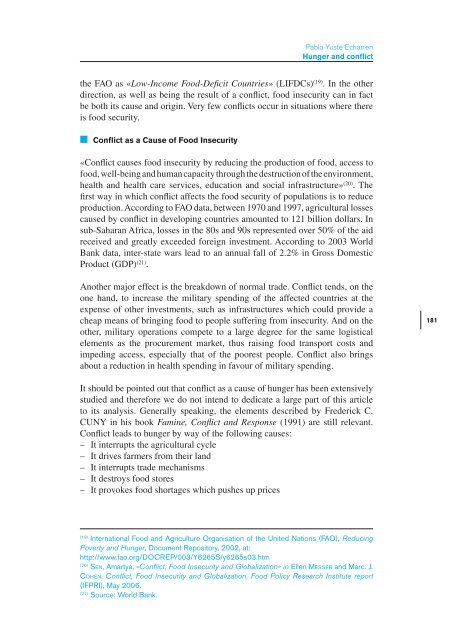Food security and global security - IEEE
Food security and global security - IEEE
Food security and global security - IEEE
- No tags were found...
Create successful ePaper yourself
Turn your PDF publications into a flip-book with our unique Google optimized e-Paper software.
Pablo Yuste EcharrenHunger <strong>and</strong> conflictthe FAO as «Low-Income <strong>Food</strong>-Deficit Countries» (LIFDCs) (19) . In the otherdirection, as well as being the result of a conflict, food in<strong>security</strong> can in factbe both its cause <strong>and</strong> origin. Very few conflicts occur in situations where thereis food <strong>security</strong>.■■Conflict as a Cause of <strong>Food</strong> In<strong>security</strong>«Conflict causes food in<strong>security</strong> by reducing the production of food, access tofood, well-being <strong>and</strong> human capacity through the destruction of the environment,health <strong>and</strong> health care services, education <strong>and</strong> social infrastructure» (20) . Thefirst way in which conflict affects the food <strong>security</strong> of populations is to reduceproduction. According to FAO data, between 1970 <strong>and</strong> 1997, agricultural lossescaused by conflict in developing countries amounted to 121 billion dollars. Insub-Saharan Africa, losses in the 80s <strong>and</strong> 90s represented over 50% of the aidreceived <strong>and</strong> greatly exceeded foreign investment. According to 2003 WorldBank data, inter-state wars lead to an annual fall of 2.2% in Gross DomesticProduct (GDP) (21) .Another major effect is the breakdown of normal trade. Conflict tends, on theone h<strong>and</strong>, to increase the military spending of the affected countries at theexpense of other investments, such as infrastructures which could provide acheap means of bringing food to people suffering from in<strong>security</strong>. And on theother, military operations compete to a large degree for the same logisticalelements as the procurement market, thus raising food transport costs <strong>and</strong>impeding access, especially that of the poorest people. Conflict also bringsabout a reduction in health spending in favour of military spending.181It should be pointed out that conflict as a cause of hunger has been extensivelystudied <strong>and</strong> therefore we do not intend to dedicate a large part of this articleto its analysis. Generally speaking, the elements described by Frederick C.CUNY in his book Famine, Conflict <strong>and</strong> Response (1991) are still relevant.Conflict leads to hunger by way of the following causes:––It interrupts the agricultural cycle––It drives farmers from their l<strong>and</strong>––It interrupts trade mechanisms––It destroys food stores––It provokes food shortages which pushes up prices(19)International <strong>Food</strong> <strong>and</strong> Agriculture Organisation of the United Nations (FAO), ReducingPoverty <strong>and</strong> Hunger, Document Repository, 2002, at:http://www.fao.org/DOCREP/003/Y6265S/y6265s03.htm(20)Sen, Amartya, «Conflict, <strong>Food</strong> In<strong>security</strong> <strong>and</strong> Globalization» in Ellen Messer <strong>and</strong> Marc. J.Cohen, Conflict, <strong>Food</strong> In<strong>security</strong> <strong>and</strong> Globalization, <strong>Food</strong> Policy Research Institute report(IFPRI), May 2006.(21)Source: World Bank.
















